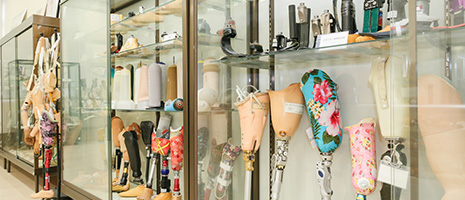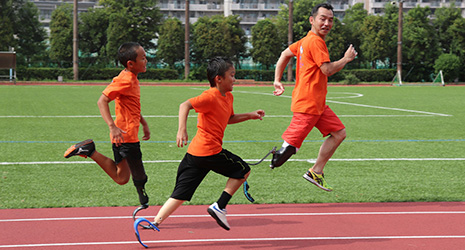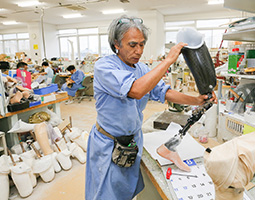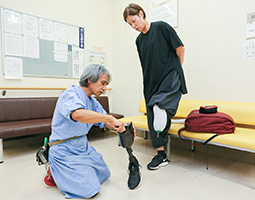Home > Highlighting JAPAN > Highlighting Japan October 2019 > THE SPORTING LIFE
Highlighting JAPAN


Enabling the Joy of Running
Fumio Usui has worked for over thirty years on the development of prosthetic legs for use in sport, in which time he has enabled countless amputees to experience or taste again the joy of running.
Start Line Tokyo, formerly known as Health Angels, was founded in 1991 and is a running club for amputees who use prosthetic legs. The club started with just a handful of members, but that number has now increased to around 220, some of whom have even become Paralympic athletes. Fumio Usui, the founder of the club, is Japan’s leading maker of prosthetic legs for sports.
“I kept switching jobs without finding one that satisfied me,” says Usui, “but at the age of 28 I got a job at the Prosthetic and Orthotic Care Center of Tetsudo Kousaikai Foundation. That was thirty-five years ago, now. At the time, there was no national qualification for prosthetists, so I learned by watching how my seniors made prosthetic legs.”
It was about two years after he started the job that Usui first encountered prosthetic legs for sport. Usui was on his honeymoon in Hawaii when by chance he visited a prosthetics workshop and was shown a carbon-fiber prosthetic leg shaped like a flat spring. The staff member said, “I bet you don’t have anything like this in Japan.” At the time, prosthetic legs specially designed for running had only just appeared in the United States, and almost no information about them had reached Japan. Usui was intrigued and after returning to Japan, he bought one of the sports prosthetic legs to use in research at his workplace, then worked at the trial and error process of research and development.
“Up to that point, the quickest way to run with a prosthetic leg was with a skipping-like motion where the healthy leg is kicked out twice, then the prosthetic leg once. Using a carbon-fiber sports prosthetic leg however, runners can kick out each leg alternately. Several young people came for the prosthetics’ first trial runs; and after running about ten strides, one of them suddenly stopped with tears running down his face. He’d suddenly remembered how it felt before his leg was amputated; what it was like to run quickly. The instant I saw him, I thought, ‘This is it!’” recalls Usui.
After that, Usui launched Start Line Tokyo. As well as boosting the number of participants in parasport through the club’s activities, he worked with Japanese prosthetic limb makers and sports equipment makers to improve prosthetic legs for sport. As a result, Start Line Tokyo has produced many top Japanese parathletes, and since the 2000 Sidney Olympics, Usui himself has been involved with the Paralympic team as a mechanic for Japan’s athletes. Nevertheless, “Not everyone needs to become a Paralympian,” says Usui.
Although around fifty people from Start Line Tokyo’s membership currently take part in each practice, fewer than ten are really serious athletes aiming to take part in the Paralympics and other events. Most enjoy running as a way to make everyday life more fulfilling. There is a huge age range among the members: from the first year of elementary school to 75 years old. There is an elementary school student who runs to increase his immune system strength after having a leg amputated due to childhood cancer; and there is an elderly person who hadn’t run for forty years, but who obtained a sports prosthetic leg and started running to fulfill a dream of running one more time.
“As an exercise, running involves coordinating many bones, muscles and joints to produce forward momentum and jumping ability, so it is an extremely difficult movement for people with prosthetic legs,” says Usui. “That’s why when people become able to run quickly and easily, it gives them great confidence, and their independence in everyday life increases by itself. I want as many people as possible to taste the joy and excitement of running.”
© 2009 Cabinet Office, Government of Japan








